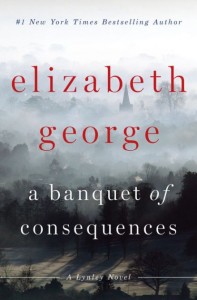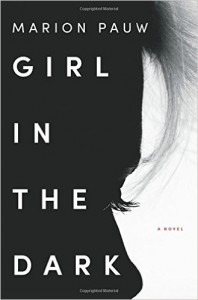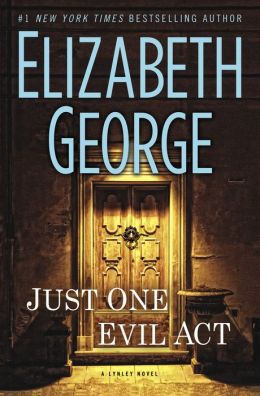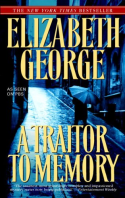All hail the debut of a new recurring column of sorts, collecting reasonably short reviews of disparate books.
 A Banquet of Consequences by Elizabeth George
A Banquet of Consequences by Elizabeth George
While A Banquet of Consequences is not the best Lynley and Havers mystery I have read, it’s still great heaping loads better than the last one (Just One Evil Act). In fact, in my review of the latter, I wrote “I wanted a book with Havers triumphant. A Havers showing that, despite her problems with professionalism and authority, she really has something amazing to offer.” And that’s pretty much what we did get this time around.
When Claire Abbott, respected feminist author, is found dead in a hotel room while on a book tour, her death is first ruled a heart attack. After her persistent friend and editor insists on a second opinion, a more thorough toxicology screening reveals the presence of poison. Having met the author and her truly odious personal assistant (and chief suspect), Caroline Goldacre, Havers begs Lynley to pull strings for her so that she can investigate, which doesn’t go over very well with Superintendent Ardery. Happily, Havers does do a competent job, though this doesn’t go very far in improving Ardery’s opinion of her.
Mystery-wise, there were elements that I guessed, but I did still enjoy the element of ambiguity that remained at the end. Too, I liked that in the next volume, the Italian detective from Just One Evil Act (probably the best thing about that dreadful book) is going to be visiting England. He was quite sweet on Havers, as I recall! My one real complaint is that Lynley had hardly anything to do, except intercede on Havers’ behalf, contemplate his relationship with Dairdre, and look after an admittedly adorable dog.
Still, it’s good to have my faith in this series somewhat restored!
 The End of Everything by Megan Abbott
The End of Everything by Megan Abbott
Lizzie Hood and Evie Verver are thirteen years old and have been BFFs and next-door neighbors for as long as they can remember. Lately, though, Lizzie has begun to realize that Evie is no longer the open book she once was. (“I know her so well that I know when I no longer know everything.”) When Evie goes missing, Lizzie does all that she can to help bring her home, while being forced to acknowledge that maybe there had always been a darkness hidden within her dearest friend that she had never noticed.
In addition to the mystery of what’s happened to Evie, this book deals a lot with Lizzie’s burgeoning sexual feelings. Though she has some contact with boys near her age, she’s really smitten with Evie’s gregarious father. She longs to be close to him, to provide clues that give him hope, to take his mind off what’s happening. She exults in her ability to affect him. In the process, she somewhat usurps the place that his eldest daughter, Dusty, has filled. What I actually liked best about the book is that Abbott leaves it up to the reader to decide—is Mr. Verver’s relationship with these girls crossing a line? Perhaps his intentions are utterly pure (and, indeed, it seems like he might be crushed to hear someone thought otherwise), but there are some things he does and says that just seem so inappropriate.
Ultimately, I liked this book quite a lot (though I feel I should warn others that some parts are disturbing). Abbott offers several intriguing parallels between relationships to consider, and I think it’s a story I will ruminate over for a long time to come.
 The Ex by Alafair Burke
The Ex by Alafair Burke
Twenty years ago, Olivia Randall sabotaged her relationship with her fiancé, Jack Harris. Now he’s the chief suspect in a triple homicide and Olivia, a defense attorney, is hired by his teenage daughter to represent him. Initially, Olivia has absolute faith in Jack’s innocence (and feels like she owes him because of how she treated him) but mounting evidence eventually makes her doubt whether she ever really knew him at all.
In synopsis form, The Ex sounds pretty interesting, but the reality is something different. Olivia herself is not particularly likeable. Setting aside how she treated Jack in the past, in the present she drinks too much and is having a casual relationship with a married man. I think we’re supposed to come away believing that this whole experience enables her to grow past some parental issues inhibiting her ability to find real love, but it’s glossed over in just about the most cursory way imaginable. And because the narration is in the first person, other characters who might have been interesting—namely a couple of other employees of the defense firm helping with the case—are exceedingly undeveloped.
The mystery plot itself is average. The final twist wasn’t something I predicted from the outset, but once a certain piece of evidence was revealed, it turned out to be very similar to another mystery I’d just read so it was a bit of a slow slog to the inevitable conclusion. The writing is also repetitive, with the significance of various clues being reiterated over and over. One genuinely unique aspect of the book is that because Olivia is a defense attorney and not law enforcement, she wasn’t overly concerned with actually solving the case, so much as finding plausible alternate suspects to establish reasonable doubt. Perhaps that is why some things the culprit did were left unexplained and some evidence unaccounted for, though it could have just been sloppy writing.
I don’t think I shall be reading anything else by this author.
 Girl in the Dark by Marion Pauw
Girl in the Dark by Marion Pauw
Set in The Netherlands, Girl in the Dark is told in alternating first-person chapters between Ray, a man with autism who has spent eight years in jail for the murders of his neighbor and her daughter, and Iris, a lawyer and single mother who discovers by chance that Ray is the elder brother she never knew she had. She is convinced of his innocence, despite evidence that he is capable of destructive rage, and begins investigating the case and pursuing an appeal, while trying to get her icy mother to talk about her past.
Although the book is advertised as a thriller, most of the time I was more infuriated than thrilled. Leaving aside the question of Ray’s guilt or innocence, the way he was/is treated by others—including Rosita, the opportunistic neighbor who used and then rejected him, as well as one of the employees of the institution he’s been transferred to, who seemingly frames Ray for smuggling drugs into the facility (there’s no resolution to this minor plot point)—generates a great deal of empathy. In particular, there is an especially cruel scene near the end of the book that made me literally exclaim, “Jesus Christ!” Although he occasionally exhibits frustrated fury, Ray is also shown to be sweet and thoughtful, at one time a skilled baker (thriving in an environment that prioritized both routine and precision) and obsessed with the welfare of his tropical fish (currently in his mother’s care).
I didn’t come away with as vivid a sense of Iris as I did Ray. The scenes involving her job and clients were, in a way, mental palate cleansers from the stress of Ray’s situation, largely bland and unmemorable. When she finally gets her hands on Ray’s case files, her end of the story improves, but there are aspects of the final resolution that are kind of ridiculous. That said, I thought the ultimate ending was satisfying and I doubt I’ll forget the book any time soon.
 Mr. Kiss and Tell by Rob Thomas and Jennifer Graham
Mr. Kiss and Tell by Rob Thomas and Jennifer Graham
Mr. Kiss and Tell came out in January 2015. I had pre-ordered it the previous May, but when it arrived I just couldn’t get into it, despite a few attempts. A couple of months later, iZombie debuted. It had all the hallmarks of a Rob Thomas show and, lo, I love it. So much so, in fact, that I started to feel like I’d be okay without further adventures in Veronica’s world. Mr. Kiss and Tell spent the next two years occupying various spots in my living room. Then, finally, I read it. And I remembered how deeply I love these characters and now I am totally sad that there aren’t any more books beyond this one. Yet.
I was somewhat disappointed that the first Veronica book, The Thousand Dollar Tan Line, did not follow up on the movie storyline about police corruption in Neptune. Happily, that plotline gets some attention in this book. Weevil is acquitted of the charges against him, but his reputation and business has taken a hit, so he agrees to a civil suit against the county. Keith works to find others who’ll testify about evidence-planting, and meanwhile a candidate enters the race against Lamb, who’d been running for reelection unopposed. There’s some closure on this by the end of the book, but still plenty of room for more going forward.
Veronica, meanwhile, is hired by the Neptune Grand to investigate a rape that took place in their hotel. The case has quite a few twists and turns, although it surprised me some by not twisting as much as I expected. (So is that, therefore, a twist?) By far, however, the best parts of the book are the conversations between the characters. Veronica and Logan, Veronica and Keith, Veronica and Weevil… I could vividly imagine each being performed by the cast, which is almost as good as not having to imagine. I especially liked that things still aren’t 100% perfect in Veronica’s world, and Logan is only home for a few months before the accidental death of one of his friends means that his shipmates are a man down. Veronica struggles to understand why he feels so strongly that he must return early, leading to my favorite scene, in which Logan reveals what his life was like in the years she was gone, and how he ended up in Officer Candidate School. It’s a bit implausible that they hadn’t had this conversation before, but it’s riveting nonetheless.
In fact, my only quibble is a bit of timeline fluffery near the beginning. On the whole, this was immensely satisfying and I will continue to hope for more books in the future. After all, never giving up hope has worked out for Veronica Mars fans in the past!
 The Mysterious Affair at Styles by Agatha Christie
The Mysterious Affair at Styles by Agatha Christie
This was a reread for me, but one I hadn’t yet reviewed, since I read it shortly before creating this blog. (I did review Christie’s second and third books before getting sidetracked. This time I shall persevere and read them all!)
A soldier named Hastings, invalided home from the front, runs into John Cavendish, an acquaintance who invites him to recuperate at Styles Court, where Hastings had often visited as a boy. It is Hastings who narrates the story of what happens there. In brief, instead of John inheriting Styles Court upon the death of his father, the property was bequeathed to his stepmother, Emily, upon whom he is presently dependent for funds. When Emily is poisoned, suspicion initially turns to her strange (and substantially younger) new husband, Alfred Inglethorp, and then ultimately onto John himself. The cast of suspects is rounded out by siblings, spouses, friends, and servants. Hastings suggests bringing his old friend Hercule Poirot in to investigate.
I did remember “whodunit,” along with the explanation for one perplexing aspect of the case, but otherwise, most of this felt new to me. In fact, I think I enjoyed it even more than the first time. Oh, I still find Hastings annoying, but Christie’s depiction of Poirot’s appearance and mannerisms struck me as especially vivid this time around, and I was left with a more distinct impression of him than I’d held previously. (I had somehow acquired a mental picture of Poirot that had him looking like Alfred Hitchcock!) Although some of the clues are a bit convoluted and/or improbable, the overall solution is satisfying and makes sense. What’s more, my enthusiasm for tackling the rest of Christie’s oeuvre has been rekindled!
 The Outpost by Mike Resnick
The Outpost by Mike Resnick
In an effort to broaden my horizons and read more science fiction, I went looking for books that might appeal to fans of Firefly. In the course of that search, I came across The Outpost. The notion of a bunch of space-faring outlaw types gathering at a bar on the edge of the galaxy, swapping stories, then banding together to fight off some aliens sounded appealing. Don’t be fooled like I was.
While it is indeed true that a bunch of space-facing outlaw types do gather to swap their stories, these recitations are actually highly embellished tall tales, and they seem to go on for an interminable amount of time. Finally, during a brief middle section of the book, the bar’s patrons go off and fight some aliens, and getting a glimpse of reality, including several pointless and unheroic deaths, was the best part of the novel. All too soon, they’re back at the Outpost, telling their war adventures with varying degrees of embellishment. It’s at this point that several very boring arguments on the ethics of “improving” history ensue.
It’s true that sometimes, I did smile or laugh at something, but on the whole this book just riled me up. None of the characters has any depth whatsoever, and several are positively odious. Many of the stories told by the guys involve busty and lusty women, and it’s fine if the characters themselves are sexist (to be fair, one of the female characters does call them out on this eventually), but most of the female characters created by Resnick are also vampy vixens whose stories are sex-oriented and whose bodily proportions are repeatedly emphasized.
I listened to the unabridged audio version read by Bob Dunsworth, and I cannot recommend it. He frequently misreads and mispronounces words, so that at one point someone is wearing “flowering” robes instead of “flowing” ones, “defenestrating” loses a syllable, “etiquette” gets a “kw” sound, et cetera. Making it through the book was a tremendous slog, and more than once I cursed my completist nature.
 These Vicious Masks by Tarun Shanker and Kelly Zekas
These Vicious Masks by Tarun Shanker and Kelly Zekas
I can’t for the life of me remember how I heard about this book. I immediately put in a materials request with my library, but when it arrived I didn’t remember it at all. It does have hallmarks of something that would appeal to me, though: a setting of England in 1882, superpowers, romance, one of the authors mentioning Buffy in the dedication… It boded well.
I found it a bit disappointing at first, however, despite an independent and snarky heroine (Evelyn Wyndham, and is that a Buffy/Angel reference?) and dialogue that made me snicker right from the start. It just seemed so like “Pride and Prejudice with superpowers” that I began to wonder who was meant to be who. (“That charming fellow Mr. Kent, set up as a romantic rival to surly and brooding Sebastian Braddock, must be the Wickham surrogate!”) Too, the constant bickering between Evelyn and Sebastian, as they work together to rescue her sister the healer from a scientist who wants to experiment on her, did grate after a while.
However, in the end the book surprised me. Not just by deviating from the Pride and Prejudice mold or by imbuing people with unsuspected powers, but by taking the plot in a direction that absolutely made sense and which I absolutely did not see coming. A sequel (These Ruthless Deeds) has just been released and verily, I shall read it.
















Recent Comments